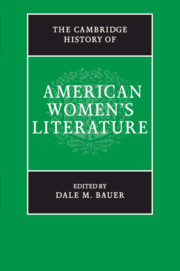Book contents
- Frontmatter
- Contents
- List of illustrations
- Acknowledgements
- Notes on contributors
- Introduction
- 1 The stories we tell: American Indian women's writing and the persistence of tradition
- 2 Women writers and war
- 3 American women's writing in the colonial period
- 4 Religion, sensibility, and sympathy
- 5 Women's writing of the Revolutionary era
- 6 Women writers and the early US novel
- 7 Women in literary culture during the long nineteenth century
- 8 Moral authority as literary property in mid-nineteenth-century print culture
- 9 The shape of Catharine Sedgwick's career
- 10 Writing, authorship, and genius: literary women and modes of literary production
- 11 Nineteenth-century American women's poetry: past and prospects
- 12 Transatlantic sympathies and nineteenth-century women's writing
- 13 Nineteenth-century African American women writers
- 14 Local knowledge and women's regional writing
- 15 Women and children first: female writers of American children's literature
- 16 US suffrage literature
- 17 American women playwrights
- 18 Turn-of-the-twentieth-century transitions: women on the edge of tomorrow
- 19 Accidents, agency, and American literary naturalism
- 20 The geography of ladyhood: racializing the novel of manners
- 21 Self-made women: novelists of the 1920s
- 22 Recovering the legacy of Zara Wright and the twentieth-century black woman writer
- 23 Jewish American women writers
- 24 Women on the breadlines
- 25 Modern domestic realism in America, 1950–1970
- 26 Lyric, gender, and subjectivity in modern and contemporary women's poetry
- 27 Contemporary American women's writing: women and violence
- 28 Asian American women's literature and the promise of committed art
- 29 Straight sex, queer text: American women novelists
- 30 Latina writers and the usable past
- 31 Where is she? Women/access/rhetoric
- 32 Reading women in America
- Index
- References
3 - American women's writing in the colonial period
Published online by Cambridge University Press: 28 September 2012
- Frontmatter
- Contents
- List of illustrations
- Acknowledgements
- Notes on contributors
- Introduction
- 1 The stories we tell: American Indian women's writing and the persistence of tradition
- 2 Women writers and war
- 3 American women's writing in the colonial period
- 4 Religion, sensibility, and sympathy
- 5 Women's writing of the Revolutionary era
- 6 Women writers and the early US novel
- 7 Women in literary culture during the long nineteenth century
- 8 Moral authority as literary property in mid-nineteenth-century print culture
- 9 The shape of Catharine Sedgwick's career
- 10 Writing, authorship, and genius: literary women and modes of literary production
- 11 Nineteenth-century American women's poetry: past and prospects
- 12 Transatlantic sympathies and nineteenth-century women's writing
- 13 Nineteenth-century African American women writers
- 14 Local knowledge and women's regional writing
- 15 Women and children first: female writers of American children's literature
- 16 US suffrage literature
- 17 American women playwrights
- 18 Turn-of-the-twentieth-century transitions: women on the edge of tomorrow
- 19 Accidents, agency, and American literary naturalism
- 20 The geography of ladyhood: racializing the novel of manners
- 21 Self-made women: novelists of the 1920s
- 22 Recovering the legacy of Zara Wright and the twentieth-century black woman writer
- 23 Jewish American women writers
- 24 Women on the breadlines
- 25 Modern domestic realism in America, 1950–1970
- 26 Lyric, gender, and subjectivity in modern and contemporary women's poetry
- 27 Contemporary American women's writing: women and violence
- 28 Asian American women's literature and the promise of committed art
- 29 Straight sex, queer text: American women novelists
- 30 Latina writers and the usable past
- 31 Where is she? Women/access/rhetoric
- 32 Reading women in America
- Index
- References
Summary
Anne Bradstreet, Mary Rowlandson, and Sarah Kemble Knight: every recent textbook covering the historical span of American literature includes at least two of those three names among its colonial-era writers. Anne Bradstreet (1612–72), an immigrant to the Massachusetts Bay Colony, published The Tenth Muse, Lately Sprung Up in America, a collection of her poetry, in 1650, and a posthumous collection with new material in 1678. Mary Rowlandson (1637–1711) spent nearly three months of captivity with the Narragansett tribe in 1676 before returning to her settlement in Lancaster, Massachusetts; her book describing these events, The Sovereignty and Goodness of God (1682), is the most well-known instance of the captivity narrative genre. Sarah Kemble Knight (1666–1727) kept a journal of her journey from Boston to New York in 1704–5, describing in lively and humorous detail her adventures on the road, an account first published in 1825 as The Journal of Madam Knight.
The isolated voices of these three writers long sustained the myths that (1) early American women wrote little and (2) “early America” was the same thing as the present-day northeastern United States. In the past few decades, those myths have been overturned. Scholars of women's literature have identified important women's writing spanning the full range of New World experience, levels of literacy, social position, wealth, and national orientation. At the same time, those working in post-colonial and hemispheric studies have resisted the teleology of later historical developments and so redefined the terms “colonial,” “American,” and “writing”.
- Type
- Chapter
- Information
- The Cambridge History of American Women's Literature , pp. 55 - 73Publisher: Cambridge University PressPrint publication year: 2012
References
- 7
- Cited by

